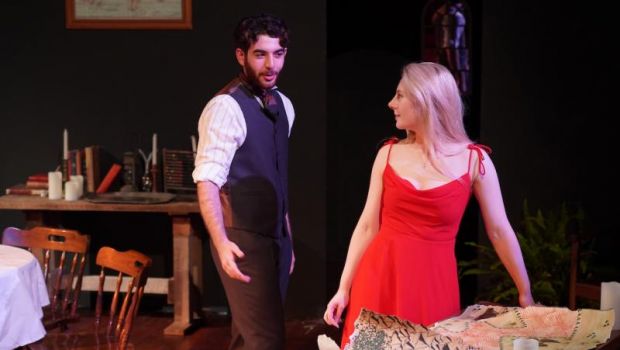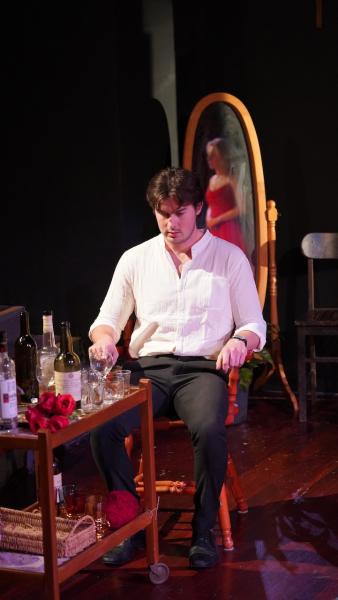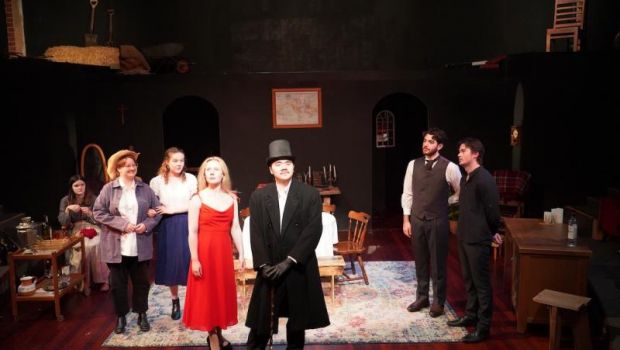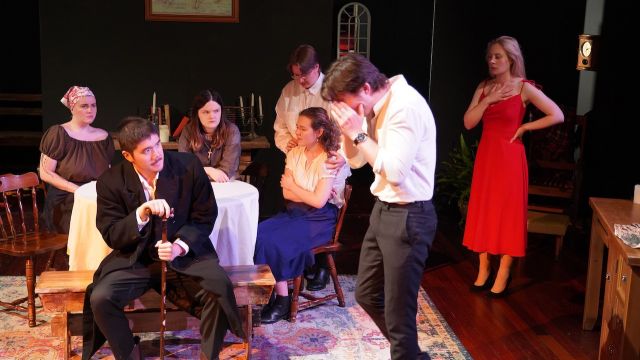Uncle Vanya
Uncle Vanya looks after the run-down house on the family estate. He lives and works there with his mother, Maria, and his niece Sonya. She is the daughter of Vanya’s late sister and the now ageing Serebryakov, who has turned up at the estate with his new – and much younger – wife, Yelena.
Everyone is bored with their lives – seemingly oblivious to their middle-class privilege in pre-revolutionary Russia – and each person in the room seems to be in love with someone else. But at least they’re talking about it, if only abstractly, but through the intellectual debate and proxy declarations of love, their true feelings push through. Of course, this triggers reactions of hate, jealousy and passion, and Chekov’s story is about what this does to the family and those close to it.
Vanya is played with intensity by Alexander Whitrow, his insecurities upset by the ongoing lack of acknowledgement from Serebryakov, his emotions in turmoil with Yelena. Whitrow has the right swagger and vulnerabilities to the role, and is believable in his sudden snap driven by both Serebryakov and Yelena.

Francesca Zagajewska is the young wife, bold in blonde and red – and the source of the only real (visual) brightness in director Connor Duncan’s design. But whilst loyal to her husband, the city-loving Yelena is just as frustrated with life as those stuck in the country. Zagajewska brings some simmer to her almost-trysts with the other men in the house, yet the sexual tension doesn’t quite match the verbal intensity between them.
Leo Chang is a suitably grumpy Serebryakov, revealing more than just what is wrong with him, but also a little of why he is like that. He is imposing in his top hat and long coat, and maintains an alternating visage of pride and indignation at his situation, his family and friends – and a surprising indifference to his wife.

This is the challenge for a young cast playing much older characters: with the exception of Yelena and Sonya, the occupants of the country house are middle-aged or elderly cynics, almost surprised at how they got old without achieving much of anything. All the actors demonstrate the emotional range of their characters, but are not so good at showing the depth of life experience, or the baggage that comes from past, complicated relationships – romantic or otherwise. This is not to say there aren’t moments of brilliance: everyone finds times to shine.
Vanya’s niece, Sonya, also Serebryakov’s daughter, (though you wouldn’t know it by how he barely acknowledges her) is beautifully played by Ellie Schaefer. Sonya is supposed to be plain, unnoticeable to Astrov, with whom she’s been in love for six years – and Schaefer fills her with six years of unexpressed emotion and unrequited love, often through just how she moves or with subtle facial expressions.
Telegin, a long-standing employee of the estate, is played by Beatrice Blackwell and their restrained performance is important in contrast to the histrionics of the main characters. Lily Watkins’ Marina, the family nanny, nearly steals each scene with her old wisdom, an acceptance of her achievements and place, with immense, dry humour that Watkins injects into every line and physical interaction with the others.
Thomas Brogden’s busy set is suitably eclectic; Mary McAuliffe’s costumes are excellent in their definition of each character’s place and role in the house; and Otto Zagala’s lighting establishes time of day and achieves some interesting illumination with bold colours.
Originally written in the late 1890s by Anton Chekov, this version was adapted by American playwright Annie Baker, who has made the language more natural and in modern English. Director Connor Duncan has taken Baker’s words and whilst presenting in the right period, shows contemporary relevance: here, they’re all sitting around reading books, but it could as easily be a laptop or mobile phone. Astrov is passionate about the unrestrained destruction of the forests, and declares his vegetarianism as a badge of honour.

It’s clear to see the love that director Connor Duncan has for this play: he has brought out passionate performances from his actors, and he uses every inch of the Little Theatre stage – though as with every play in this thrust-amphitheatre design, it’s challenging to position a large number of actors without dialogue being obscured.
Uncle Vanya isn’t a story with much resolution – each character knows a lot more about the others by the end of act four, but the narrative is circular. Where it succeeds is in the examination of how we handle our lack of major achievements, whether it’s in what we do or who we love. We see what doesn’t happen when we keep our feelings to ourselves, and the highs and lows of revealing our hearts’ desires. The first word of the play’s title indicates where we should look for hope: it’s named after her uncle, but it’s Sonya who reminds us that despite past disappointments, we can – and should - go forward, and live.
Mark Wickett
Subscribe to our E-Newsletter, buy our latest print edition or find a Performing Arts book at Book Nook.

